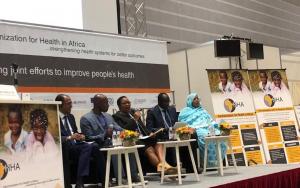Health leaders see urgency of better coordination among partners for delivering universal health coverage in Africa
Tokyo, 28 August – African health leaders urged development partners to better coordinate their efforts when supporting countries in strengthening their health systems towards achieving universal health coverage and health security. The call came during a side event, organized today by the World Health Organization (WHO) and other Harmonization for Health in Africa partners, during the Tokyo International Conference on African Development taking place in Yokohama this week.
Despite the adoption of the Paris Declaration on Aid Effectiveness by world leaders in March 2005 “to take far-reaching” actions to reform the ways aid is delivered and managed, along with other landmark agreements, delivery of development assistance to the Africa region remains fragmented. Donor agencies continue to lack coordination, and their activities are often duplicative, with high transaction costs, all of which contributes to the ineffective and inefficient use of limited resources.
The Harmonization for Health in Africa is a regional coordination mechanism that has been in place for more than a decade to promote collaborative approaches to supporting national health systems.
“Effective health systems are the backbone for the achievement of UHC,” H.E. Nana Akufo-Addo, President of Ghana, said in his keynote address to the side event on the Alignment and Harmonization for Health System Strengthening Towards Universal Health Coverage [UHC] in the Africa Region.
“We in Ghana believe a window of opportunity is opening for meaningful health systems reform,” he added. Driving the need for reforms, he said, are epidemiologic shifts, such as ageing populations, increased public expectation for affordable and accessible care, and economic hardships that are “prompting people to put more pressure on their government to expand their social safety nets, including health protection.”
The Harmonization for Health in Africa (HHA) initiative works with countries to build up their capacities by providing joint technical support, which has helped address health system constraints and improve health-related outcomes in a sustainable and effective manner. HHA partners have jointly trained experts in 52 countries on public finance management. They have fostered dialogue among development partners, between ministers of health and finance, parliamentarians, civil societies and the private sector to work towards better coordination.
“Across the African Region, momentum is building for universal health coverage,” said Dr Matshidiso Moeti, WHO Regional Director for Africa. “Many countries are implementing reforms for better financing and essential service packages. Moving forward, a key question we need to address is how to continue working towards universal health coverage in the context of humanitarian crises. This is a key consideration in strengthening our joint action to bridge the humanitarian-development nexus and in building the resilience of health systems.”
The funding landscape, she added, “has tremendously changed in the health sector over the past decade, with non-traditional partners, new alliances and platforms and the private sector emerging as important players.”
“We cannot talk about harmonization without talking about harmonizing policies,’’ said H.E. Amira Elfadil Mohammed Elfadil, African Union Commissioner for Social Affairs. “We have to start from there. What I think is the challenge for Africa is sometimes we have ready-made initiatives and strategies, but the correct thing to do is engaging us at the conceptualization level of any new initiative. We have to start as partners from the level of conceptualization. We have to stop bringing ready-made initiatives to the continent.”
Other speakers during the side event were Michel Sidibé, Minister of Health and Social Affairs of Mali, Abdoulaye Diouf Sarr, Minister of Health of Senegal, Sicily Kanini Kariuki, Cabinet Secretary for Health, Ministry of Health Kenya and Mohamed Moustapha Malick Fall, Regional Director of UNICEF, East and Southern Africa.
The Harmonization for Health in Africa members include the African Development Bank; the Government of France; the Global Fund to Fight AIDS, Tuberculosis and Malaria; the Japan International Cooperation Agency; the International Organization for Migration; the Joint United Nations Programme on HIV/AIDS; the United National Population Fund; the United Nations Children’s Fund; UN Women; the United States Agency for International Development; the Partnership for Maternal, Newborn and Child Health; and WHO.
Communications Manager
WHO Regional Office for Africa
Email: okas [at] who.int (okas[at]who[dot]int)
Tel: +242 06 508 1009
Consultant
Email: emmonsk [at] who.int (emmonsk[at]who[dot]int)



